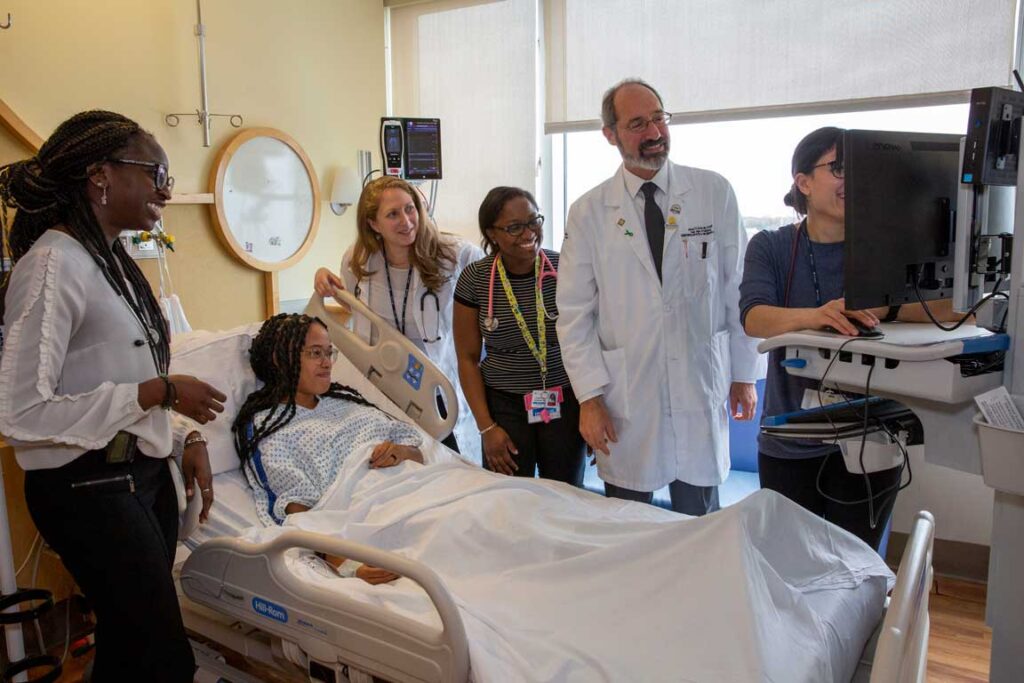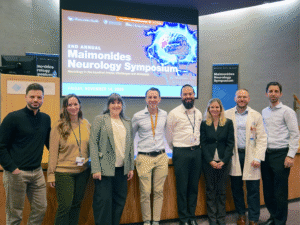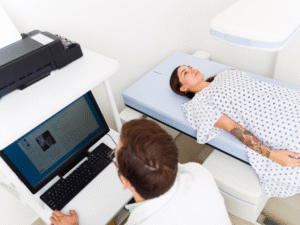At Maimonides, training future clinical experts and shaping the next generation of health care is a top priority. Our robust medical education and training programs are a critical part of this. The summer months are a time of great transition, with most residency and fellowship programs beginning each year around July 1.
This year, Maimonides is host to 164 trainees starting new programs, including residencies and fellowships, according to Robin Gitman, Vice President of Academic Affairs at Maimonides. Our residency programs span a variety of specialties, including pediatrics, general surgery, anesthesiology, obstetrics and gynecology, radiology, psychiatry and more. Maimonides is a key teaching affiliate and clinical training site of SUNY Downstate College of Medicine. Our partnership allows medical students, residents, and fellows of SUNY Downstate access to training in our advanced clinical specialty programs.
Get to Know Maimonides’ Residents, Fellows and Medical Students
Currently, there are more than 500 residents and fellows in training at Maimonides, representing not only a variety of medical specialties and skills, but also a host of diverse backgrounds. 51% identify as female, 48% identify as male, and 1% identify as nonbinary or other. Trainees come from as far as Asia, Africa, Southeast Asia, and the Middle East.
In this year’s cohort of first-year residents and fellows, members are qualified for medical communication in nine different languages other than English, including Haitian Creole, French, Mandarin, Spanish, and Urdu, according to Marina Chilingarova, Language Assistance Coordinator at Maimonides. Last year’s incoming residents, now in PGY-2, speak 27 different languages.
World-Class Training and Research Opportunities
Students, fellows, and staff have the opportunity to develop clinical skills in our world-class Clinical Simulation Center, which is formally accredited through the Society for Simulation in Healthcare. The Center creates an experiential learning environment with educational activities for trainees that include onboarding, multidisciplinary team training, communication and professionalism development, procedural skills, and medical knowledge.
“Our mission is to promote patient safety through an immersive simulation-based experiential learning environment for staff at Maimonides Medical Center that fosters teamwork, reduces risk, promotes just culture, supports quality improvement, and develops leaders in healthcare simulation,” said Amish Aghera, MD, Director of the Clinical Simulation Center. “60 to 65% of our learner volume are residents, the rest is mostly a combination of students, fellows, nurses, and attending physicians.”
Cutting-edge training technologies like fully immersive virtual reality simulations and high-fidelity patient mannequins, and even practicing patient skills with professional actors, allow trainees to utilize a controlled environment to learn realities of practice and patient care.
Residents are also encouraged to participate in research aligned with their clinical and scientific interests, and many have presented at regional and national conferences. Maimonides has dedicated staff who personally mentor and review residents’ research projects, inclusive of abstract and manuscript review prior to journal submission for publication.
Programs like the Maimonides Summer Research Experience, which welcomed 39 talented medical students across eight departments this year, allow Maimonides to continue to foster research experience and skills for the next generation of medical experts while promoting diversity and inclusion in the medical field. At the program’s inception four years ago, it had just nine participants.
New Fellowship Programs Celebrate Successful First Years
The past year has been especially exciting regarding training at Maimonides because it marked the beginning of two new fellowship programs: emergency medical services and surgical critical care.
Maimonides’ first emergency medical services fellow is set to graduate at the end of September, while the program’s second fellow has begun training, according to Matt Friedman, MD, Associate Medical Director of Prehospital Care at Maimonides and Fellowship Director. Fellows in the ACGME-accredited program specialize in prehospital medicine, improving the care that is delivered before patients arrive in the emergency department, and training and educating prehospital providers such as EMTs and paramedics.
With six board-certified EMS physicians on the emergency medicine faculty at Maimonides, EMS fellows are mentored by some of the city’s foremost experts in the field. It is one of the only fellowships of its kind in New York. Before 2022, there was only one EMS fellowship in New York City, which graduates two fellows annually and is managed by the FDNY.
“Maimonides is in such a unique space to offer an EMS fellowship because we have 15 Maimonides ambulances which are operating within the New York City 911 EMS system,” said Dr. Friedman. “We are the second-largest contributor of ambulances in New York City in the 911 system after FDNY. Additionally, we perform a lot of event medicine at Maimonides, which is a unique experience and a fabulous educational opportunity for the EMS fellow.”
The fellowship is not only an incredible and unique learning opportunity, but also part of a larger initiative by Maimonides’ EMS Department to improve the medical care delivered in the streets of Brooklyn.
The surgical critical care fellowship program is likewise improving care for Maimonides patients, according to Ronald Simon, MD, Chief of Trauma and Acute Care Surgery and Program Director of the Surgical Critical Care Fellowship.
“The first year is going very well,” said Dr. Simon. “Our fellow is very pleased with his education. The program was created because we felt we offered outstanding care in our surgical intensive care unit and that there was enough clinical volume and attending physicians with enthusiasm for teaching to make a fellowship a worthwhile experience for patients, residents, the fellow, and our attendings.”
Home to a Level-1 Trauma Center, a Comprehensive Stroke Center, and Brooklyn’s only Pediatric Trauma Center, Maimonides cares for a diverse range of critical care cases, making it an ideal environment for new surgeons to provide care for anyone from young trauma patients to older patients with more complex medical histories. Additionally, fellows bring with them to Maimonides strong experience that not only benefits patients directly, but also strengthens the education of surgical residents who are able to learn from the surgical critical care fellow.
Both fellowship programs are set to continue next year, maintaining their current sizes.
For more information on Maimonides’ medical education programs, visit: https://maimo.org/medical-education/.




